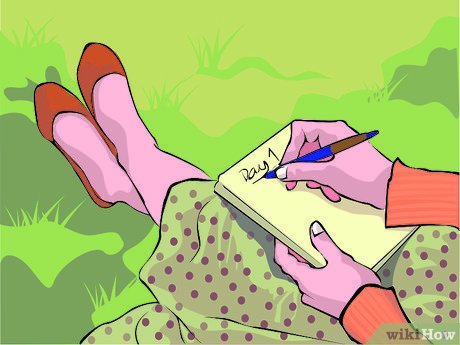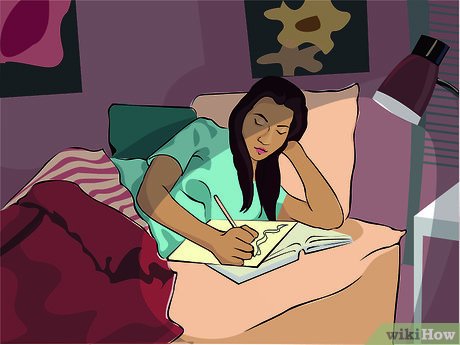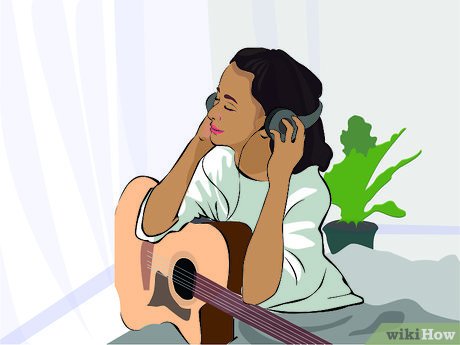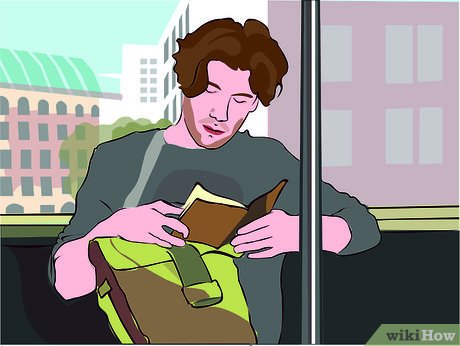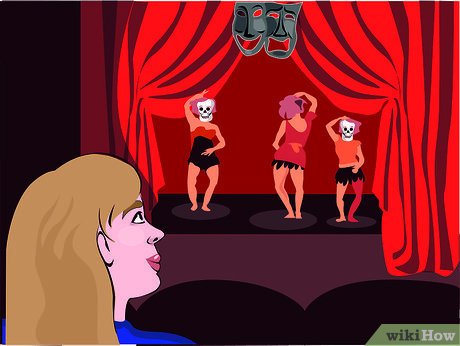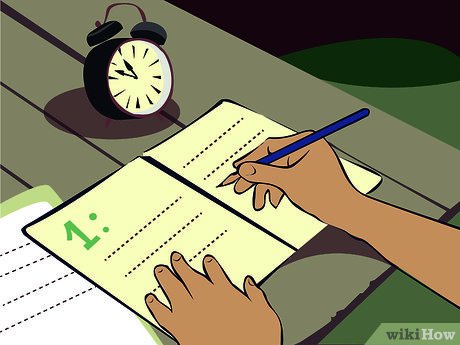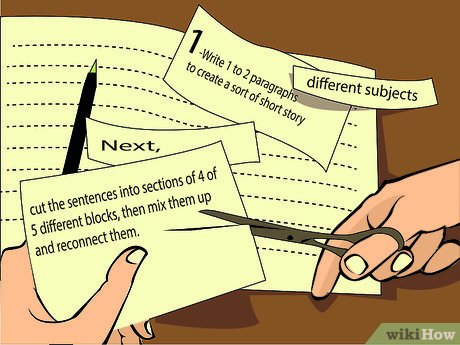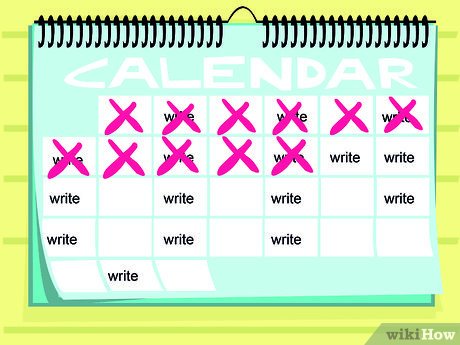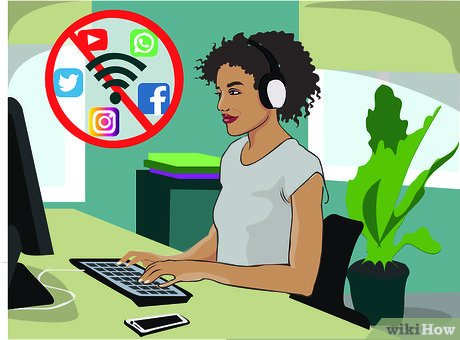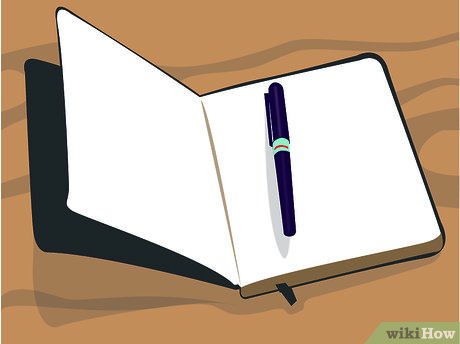How to Find Inspiration to Write Songs
Method 1 of 4:
Drawing on Your Personal Experiences
-
 Write about yourself. Your life experience (memories, opinions, emotions) is your richest resource and your perspective is what will ultimately make your song unique. Keeping a list of things that happen to you or emotions that go through you will give you a wealth of material to draw on.[1]
Write about yourself. Your life experience (memories, opinions, emotions) is your richest resource and your perspective is what will ultimately make your song unique. Keeping a list of things that happen to you or emotions that go through you will give you a wealth of material to draw on.[1]- For example, keep note of stories that you hear or experience.[2] They are a great source of material not only because they are unique, but also because they have a range of emotions.
-
 Write about your emotions. Think about an emotionally charged event in your life, such as a death, wedding, birth, falling in love, etc. Do your best to describe what you felt at that time and try to be as detailed as possible.
Write about your emotions. Think about an emotionally charged event in your life, such as a death, wedding, birth, falling in love, etc. Do your best to describe what you felt at that time and try to be as detailed as possible.- For example, if writing about a breakup, list words that describe the scene: how you felt, the surroundings, what colors stood out to you, etc. Don't worry about rhyme or melody yet.
-
 Keep a journal. Many of us go through our days and only write down notes, lists, emails and the like but keeping a journal will allow you to reflect on what you are going through and provide you with material from which you can mine different images and phrases for your songs.
Keep a journal. Many of us go through our days and only write down notes, lists, emails and the like but keeping a journal will allow you to reflect on what you are going through and provide you with material from which you can mine different images and phrases for your songs. -
 Write down your dreams. Many of us have strange, abstract dreams that we quickly forget about after waking up. Instead of letting go of those interesting images and unusual situations, keep a dream journal! Not only will writing down your dreams help you remember them for longer, but you'll have a new repository of strange and unique stories and images to use for your songs.
Write down your dreams. Many of us have strange, abstract dreams that we quickly forget about after waking up. Instead of letting go of those interesting images and unusual situations, keep a dream journal! Not only will writing down your dreams help you remember them for longer, but you'll have a new repository of strange and unique stories and images to use for your songs.- Keep a pen and journal by your bed so that you can write down your dreams as soon as you wake up.
-
 Leave the house. Go for walks in public places and look at other people or your surroundings for inspiration. Lots of songwriters write about nature, other people, or interesting experiences. Get out there and let the world inspire you.
Leave the house. Go for walks in public places and look at other people or your surroundings for inspiration. Lots of songwriters write about nature, other people, or interesting experiences. Get out there and let the world inspire you.- Try eavesdropping. Sometimes, listening in on someone else's conversation can open you up to a new perspective. You may even find something intriguing or lyrical in their words.
- If there's a place you feel particularly emotionally connected to, such as a park, go there with a pen and paper, sit down, and write whatever comes to mind.
-
 Try something new. Many musicians lead very interesting lives that also serve as inspiration for their lyrics.[3] Get out of your comfort zone and try something new. Whatever the outcome, it'll certainly give you something to write about.
Try something new. Many musicians lead very interesting lives that also serve as inspiration for their lyrics.[3] Get out of your comfort zone and try something new. Whatever the outcome, it'll certainly give you something to write about.- Trying new things can give you an adrenaline rush, which can be inspiring. You can do something extreme, like skydiving, or something simple, like trying a new recipe.[4]
-
 Be nostalgic. Look at old photo albums, reread old letters, visit family and childhood friends and talk about the past. Nostalgia is a very powerful mix of emotions and from these activities can emerge many stories and emotions to draw on.[5]
Be nostalgic. Look at old photo albums, reread old letters, visit family and childhood friends and talk about the past. Nostalgia is a very powerful mix of emotions and from these activities can emerge many stories and emotions to draw on.[5]
Method 2 of 4:
Getting Inspired by Art
-
 Listen to music. This may seem obvious, but listening to music and paying attention to the song lyrics will not only teach you more about the mechanics of successful song lyrics, but can also be inspiring.
Listen to music. This may seem obvious, but listening to music and paying attention to the song lyrics will not only teach you more about the mechanics of successful song lyrics, but can also be inspiring.- Take a walk and listen to music without lyrics. This can help inspire you to come up with new lyrics. If you come up with good lines, write them down!
- Listen to the music that inspired you to start songwriting. Doing so will help you know what to emulate and what to avoid in your own songs.
- Pay attention to the classics. Iconic songwriters, from Quincy Jones to Woody Guthrie, attained their status for a reason. Note the lyrics, arrangement, and structure.[6]
- Listen to new types of music. Broadening your musical horizons will inspire you to incorporate new sounds or styles that you wouldn't have otherwise considered.
-
 Explore other art forms. You don't have to limit yourself to music for inspiration. Try to consume as much art as possible in all its different forms as doing so can inspire you in unexpected ways. Watch movies, read books, go to art galleries--anything creative can feed your own artistic spirit.
Explore other art forms. You don't have to limit yourself to music for inspiration. Try to consume as much art as possible in all its different forms as doing so can inspire you in unexpected ways. Watch movies, read books, go to art galleries--anything creative can feed your own artistic spirit.- Reading poetry is a great place to start because it is most similar to song lyrics.
- Reading literature has the added benefit of expanding your vocabulary, which you can also use in your own songs.[7]
-
 Pay attention to unconventional art forms. Inspiration is all around us as long as we are open to it. From street art to experimental theatre, the more you get out of your comfort zone, the more exciting possible inspirations you may find.
Pay attention to unconventional art forms. Inspiration is all around us as long as we are open to it. From street art to experimental theatre, the more you get out of your comfort zone, the more exciting possible inspirations you may find.- For example, you could look at the graffiti in your area. Many street artists make public art for a variety of reasons, such as raising political awareness.[8] Note any descriptions, phrases, or emotions that come to mind.
- Discomfort isn't always a bad thing. New experiences can make you uncomfortable, but they can also inspire you to produce new, exciting work, especially if you feel like you're creating the same thing over and over.[9]
Method 3 of 4:
Using Writing Exercises to Get Inspired
-
 Experiment with different writing exercises. There are many different writing exercises one can use to get inspired. If you're feeling really stumped and don't know where to start, try a writing exercise. Having a specific set of instructions can take the pressure off and get those creative juices flowing.
Experiment with different writing exercises. There are many different writing exercises one can use to get inspired. If you're feeling really stumped and don't know where to start, try a writing exercise. Having a specific set of instructions can take the pressure off and get those creative juices flowing.- If you feel intimidated, tell yourself that you'll only write for 5 minutes. If nothing comes out, you'll know that you've at least tried.
- If you find yourself settling into the writing process after 5 minutes, you're likely to come out with at least a few ideas you're happy with.
-
 Try writing about an object. This is a songwriting exercise called 'Choose an Object' used at the Berklee College of Music and can be very helpful in generating new ideas.
Try writing about an object. This is a songwriting exercise called 'Choose an Object' used at the Berklee College of Music and can be very helpful in generating new ideas.- For this exercise, choose an object at random, then spend 10 minutes or so writing any memories you associate with it.
- Don't worry about making it sound good or writing complete sentences. Focus on using as many different senses as possible. You'll end up with a list of images and emotions, which you can use as inspiration later on.[10]
-
 Try a David Bowie-approved exercise. Bowie has described one of his methods for songwriting and you may want to give it a try to see if it works for you. This exercise can be particularly useful for those times when you just have no idea what you want to write about.
Try a David Bowie-approved exercise. Bowie has described one of his methods for songwriting and you may want to give it a try to see if it works for you. This exercise can be particularly useful for those times when you just have no idea what you want to write about.- Write 1 to 2 paragraphs different subjects to create a sort of short story. Next, cut the sentences into sections of 4 of 5 different blocks, then mix them up and reconnect them.[11]
Method 4 of 4:
Developing a Writing Habit
-
 Find a quiet space to work in. Though we often think of inspiration as something that just strikes us, a certain level of discipline is also necessary to create polished song lyrics. Having a set place to focus and be creative can motivate you to keep up a regular practice of songwriting.
Find a quiet space to work in. Though we often think of inspiration as something that just strikes us, a certain level of discipline is also necessary to create polished song lyrics. Having a set place to focus and be creative can motivate you to keep up a regular practice of songwriting.- Something as simple as a desk can be a great place to write. You can even decorate the space with some of your favorite musical inspirations to keep you inspired.
- Studies have shown that the color blue can enhance performance on a creative task.[12] Try repainting your space blue or have blue decorations in your space to keep you going.
-
 Decide on a writing routine. Some people feel most inspired and excited to write first thing in the morning while other people find the evening time to be best for their creativity. Figure out what time of the day works for you (bearing in mind other responsibilities, such as your job and schoolwork) and decide on a writing routine accordingly.[13]
Decide on a writing routine. Some people feel most inspired and excited to write first thing in the morning while other people find the evening time to be best for their creativity. Figure out what time of the day works for you (bearing in mind other responsibilities, such as your job and schoolwork) and decide on a writing routine accordingly.[13]- Schedule this time into a calendar or planner, if you use one. After a few weeks of consciously doing this, it'll eventually become second nature and you'll have a steady flow of written material for your songs.
-
 Minimize distractions. It's all too easy to get distracted by social media, chores, and all the other daily aspects of life that demand our attention. However, having a specific time and place to do your writing will carve out some space that takes you away from all of that.
Minimize distractions. It's all too easy to get distracted by social media, chores, and all the other daily aspects of life that demand our attention. However, having a specific time and place to do your writing will carve out some space that takes you away from all of that.- If you use your computer to write, make a commitment to not use the Internet until you get a set amount of work done.[14]
- If you find yourself constantly itching to look things up, turn off the wifi and write notes in your work of what to research once you are done with the rough draft.
-
 Collaborate with others. Think about who in your life is also engaged in artistic pursuits and ask them if they would be willing to collaborate with you. Collaborating can be as easy as giving each other feedback on each other's work or even starting a new project together. Not only will you motivate each other to produce work, but you'll also get great feedback and a fresh outlook that will make you a better songwriter.[15]
Collaborate with others. Think about who in your life is also engaged in artistic pursuits and ask them if they would be willing to collaborate with you. Collaborating can be as easy as giving each other feedback on each other's work or even starting a new project together. Not only will you motivate each other to produce work, but you'll also get great feedback and a fresh outlook that will make you a better songwriter.[15]- Your collaborators don't necessarily have to be musicians. In fact, working with an actor or writer may be even better as you'll get a totally different perspective.
- Be proactive about receiving constructive criticism. After all, you want new, good ideas and so don't take criticism personally but instead see them as an opportunity to improve.
-
 Join a writing group. If you're having trouble being disciplined about your writing, consider joining a writing group! Writing groups are generally open to all different forms of writing and knowing that you have an audience that is going to read your work and give you feedback can motivate you to just sit down and get that song onto paper.
Join a writing group. If you're having trouble being disciplined about your writing, consider joining a writing group! Writing groups are generally open to all different forms of writing and knowing that you have an audience that is going to read your work and give you feedback can motivate you to just sit down and get that song onto paper.- Oftentimes you can find local writing groups that meet once a month or so to do writing workshops. Look for ads in cafes or other community spaces.
- If you feel uncomfortable talking about your work in person, you can also find online writing groups.
-
 Keep a notebook and pen on you at all times. You never know when inspiration will strike so you'll always want to be able to have these important tools handy.[16]
Keep a notebook and pen on you at all times. You never know when inspiration will strike so you'll always want to be able to have these important tools handy.[16]- Writing notes down on your phone is a good alternative if you aren't the type to carry a bag around.
Share by
Kareem Winters
Update 24 March 2020
You should read it
- ★ 7 simple ways to practice writing skills
- ★ How to Write a Letter Pleading Not Guilty
- ★ 8 mistakes when writing a CV that put you at risk of long-term unemployment
- ★ The best apps that support writing and writing notes on Android
- ★ How to write effective CVs to 'attract' employers in the first 6 seconds


